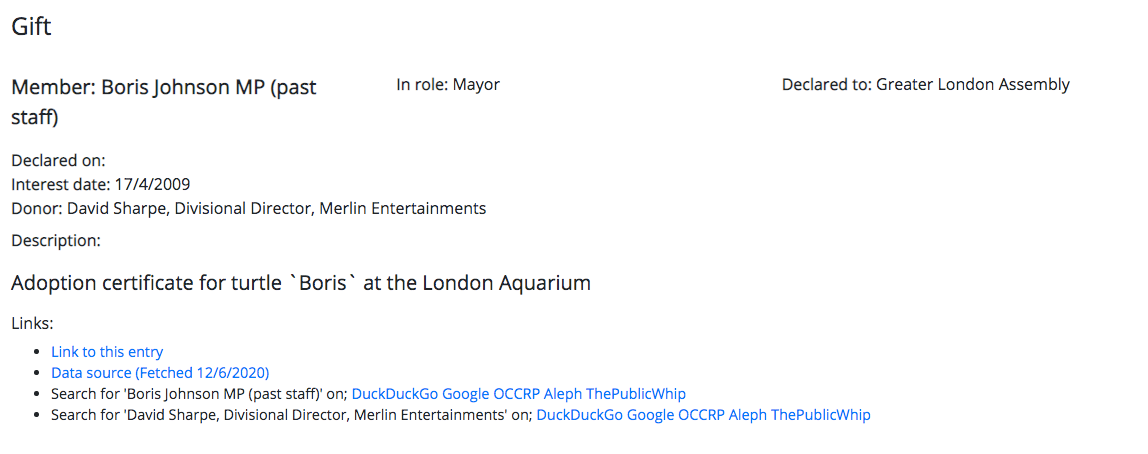We’ve been working with OpenDemocracy to help build declared. — a prototype search engine and data explorer that collects declarations of interests, gifts, employment and more from elected members of bodies around the UK. The project was funded by the Future News Pilot Fund by the Department for Digital, Culture, Media and Sport via Nesta.
Anyone who holds public office in the UK needs to declare financial interests and other benefits because of the potential for influencing any decisions and/or representations they’re making.
At the moment, access to this information is poor. Different bodies often present data in different formats — in the worst cases as handwritten forms that have been scanned and uploaded as a pdf on a council’s website.
Because this information isn’t available as standardised data, it’s difficult to understand, work with and analyse. To find out how many politicians in the UK have been financed by a specific company, for example, you’d need to find where that data is published, scrape it, transform it into a standard format and then load it into a database that can be queried. There’s also no existing historical archive, so you can’t track changes over time.
What is declared.?
declared. is a proof of concept that shows what we could do if politicians were required to declare their interests as open, standardised data.
Over the past three months, we’ve written scrapers to get data about the declarations of financial interests of politicians in certain areas, built a data standard for it and deployed a search engine that sits on top. This means you get to see all the information in one place, and search it in ways that would have taken hours before.
The data standard we’ve built — which is based on the existing reporting standards — can form the basis for local councils and Westminster to publish better data about UK politicians financial disclosures.
The diversity of formats, detail and quality represented by these declarations made work on declared. challenging. As a result the site is not as useful as we’d like it to be, but it is definitely easier to analyse members’ interests now. You can also start to find links between members’ declarations, for example by searching for a company name.

What have we learnt?
A real highlight has been the feedback from user research. It’s shown us how you can take something minimal, put it in front of people, and have them find it useful straight away. Journalists already learned things they didn’t know, and found anomalies they want to look at further. It’s really affirming that we’re building something that’s genuinely useful.
We also learnt a lot about refining data standards. We started off building a really expansive standard to cover almost every possible declaration. Our final version is much more minimal, and comes out of our improved understanding of what data is available, what common factors we find in the data, and how people want to use the data.
What comes next?
From a governance point of view, we’re thinking about how we build an economic sustainability model so that we can make the same tool available for both paid and non paid users.
From a technical point of view, there’s a lot we can do. We’d like to expand the scope of our coverage, and we plan on making the search engine more intuitive based on feedback. We’ve also thought about prototyping a notification service, so users can be updated or new declarations or changes to old ones.
In the long run, manually curating this data isn’t really a viable solution. Ultimately we want to see politicians publishing declarations of interest as open, standardised data. We’re currently looking for funders and investors to help us take it to the next level.
